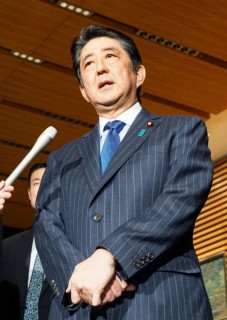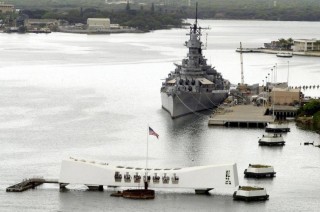Loading
Search
▼ Abe’s Pearl Harbor Visit Rooted in Pragmatism Amid Uncertainties Surrounding Trump
- Category:Other
Prime Minister Shinzo Abe’s visit this month to Pearl Harbor will be a historic gesture that represents the strength of the Japan-U.S. alliance and the evolution of the bilateral relationship since World War II.
But the trip is also rooted in pragmatism amid uncertainties surrounding the incoming administration of outspoken and erratic U.S. President-elect Donald Trump.
Experts have lauded the timing of the visit, which will coincide with the final summit between Abe and outgoing President Barack Obama on Dec. 26 and 27. Although it had been in the planning stages since the two nations marked the 70th anniversary of World War II’s end — far ahead of Trump’s electoral victory — they say the meeting is expected to send a message to Trump that the alliance in its current form works.
The alliance has seen significant progress under the stewardship of Abe and Obama; the two sides in 2015 upgraded their defense guidelines for the first time in 18 years, and Tokyo enacting contentious security laws this year allowing the Self-Defense Forces to aid the U.S. military in limited scenarios.
Yet despite this progress, Trump has unnerved U.S. allies, including Japan, by saying during the election campaign that they must cough up more cash if they wish to shelter under the U.S. security umbrella.
Trump also ripped Obama’s much-trumpeted visit to Hiroshima — the first by a sitting U.S. president. He openly questioned whether Obama discussed Pearl Harbor with Japanese officials during the visit, and proclaimed that “thousands of American lives were lost.” More than 2,400 U.S. servicemen and civilians were killed in the devastating sneak attack on Dec. 7, 1941, that thrust the U.S. into the war.
Kent Calder, Director of the Edwin O. Reischauer Center for East Asian Studies at John Hopkins University’s School of Advanced International Studies, said Abe’s visit could soften the incoming administration’s view of Japan.
“It also probably makes the U.S.-Japan alliance more constructive to some of Trump’s supporters, or at least more palatable … because it looks like Abe is being contrite, and that he is reflecting on what Japan did and he is not insisting on both taking economic advantage and historical or geopolitical advantage,” Calder said.
For Abe, visiting Pearl Harbor is among the foremost postwar issues he has been keen to settle.
Last year, he became the first sitting prime minister to address a joint session of Congress, during which he mentioned Pearl Harbor and the Japanese attack.
Yet settlement does not necessarily mean an apology.
During a Monday news conference, the prime minister emphasized the nature of the visit as intended to “console victims” of the Japanese attack 75 years ago. This phrasing was similar to Abe’s speech in Congress, where he also avoided using more direct language that might constitute an apology.
Chief Cabinet Secretary Yoshihide Suga on Tuesday echoed Abe, making it clear that the purpose of the visit is to remember the victims, not to apologize for Japan’s actions. Foreign Minister Fumio Kishida, who will be traveling with Abe, repeated that position.
While the White House has welcomed Abe’s announcement, bitter feelings on the U.S. side may remain.
When asked if the U.S. government expects an apology, White House press secretary Josh Earnest noted that veterans and survivors “may feel personally embittered.”
Still, Earnest added that he is “confident that many will set aside their own personal bitterness … because they recognize how important this moment is for the United States.”
Sheila Smith, senior fellow for Japan studies at the Council on Foreign Relations, said that rather than focusing on apologies, the two countries should instead devote their energies to preventing a repeat of war.
“I think it is an important place for Japanese and Americans to think how far we’ve come,” Smith said. “I think that what we all need to remember today is that wars are devastatingly costly to everybody. Abe’s visit demonstrates the acceptance of the consequences for Japan of that decision.”
But the trip is also rooted in pragmatism amid uncertainties surrounding the incoming administration of outspoken and erratic U.S. President-elect Donald Trump.
Experts have lauded the timing of the visit, which will coincide with the final summit between Abe and outgoing President Barack Obama on Dec. 26 and 27. Although it had been in the planning stages since the two nations marked the 70th anniversary of World War II’s end — far ahead of Trump’s electoral victory — they say the meeting is expected to send a message to Trump that the alliance in its current form works.
The alliance has seen significant progress under the stewardship of Abe and Obama; the two sides in 2015 upgraded their defense guidelines for the first time in 18 years, and Tokyo enacting contentious security laws this year allowing the Self-Defense Forces to aid the U.S. military in limited scenarios.
Yet despite this progress, Trump has unnerved U.S. allies, including Japan, by saying during the election campaign that they must cough up more cash if they wish to shelter under the U.S. security umbrella.
Trump also ripped Obama’s much-trumpeted visit to Hiroshima — the first by a sitting U.S. president. He openly questioned whether Obama discussed Pearl Harbor with Japanese officials during the visit, and proclaimed that “thousands of American lives were lost.” More than 2,400 U.S. servicemen and civilians were killed in the devastating sneak attack on Dec. 7, 1941, that thrust the U.S. into the war.
Kent Calder, Director of the Edwin O. Reischauer Center for East Asian Studies at John Hopkins University’s School of Advanced International Studies, said Abe’s visit could soften the incoming administration’s view of Japan.
“It also probably makes the U.S.-Japan alliance more constructive to some of Trump’s supporters, or at least more palatable … because it looks like Abe is being contrite, and that he is reflecting on what Japan did and he is not insisting on both taking economic advantage and historical or geopolitical advantage,” Calder said.
For Abe, visiting Pearl Harbor is among the foremost postwar issues he has been keen to settle.
Last year, he became the first sitting prime minister to address a joint session of Congress, during which he mentioned Pearl Harbor and the Japanese attack.
Yet settlement does not necessarily mean an apology.
During a Monday news conference, the prime minister emphasized the nature of the visit as intended to “console victims” of the Japanese attack 75 years ago. This phrasing was similar to Abe’s speech in Congress, where he also avoided using more direct language that might constitute an apology.
Chief Cabinet Secretary Yoshihide Suga on Tuesday echoed Abe, making it clear that the purpose of the visit is to remember the victims, not to apologize for Japan’s actions. Foreign Minister Fumio Kishida, who will be traveling with Abe, repeated that position.
While the White House has welcomed Abe’s announcement, bitter feelings on the U.S. side may remain.
When asked if the U.S. government expects an apology, White House press secretary Josh Earnest noted that veterans and survivors “may feel personally embittered.”
Still, Earnest added that he is “confident that many will set aside their own personal bitterness … because they recognize how important this moment is for the United States.”
Sheila Smith, senior fellow for Japan studies at the Council on Foreign Relations, said that rather than focusing on apologies, the two countries should instead devote their energies to preventing a repeat of war.
“I think it is an important place for Japanese and Americans to think how far we’ve come,” Smith said. “I think that what we all need to remember today is that wars are devastatingly costly to everybody. Abe’s visit demonstrates the acceptance of the consequences for Japan of that decision.”
For Obama, the trip by Abe is a chance to burnish his legacy — especially considering the beating it has taken by Trump, who has bashed his other signature achievements, including the Iran nuclear deal and diplomatic normalization with Cuba.
Experts, however, agree that the big winner of the visit will be Abe.
Fumiaki Kubo, a professor of U.S. government and history at the University of Tokyo, said that with a single trip, Abe would have the chance to cast aside a perception that has long dogged him — the label that he is a staunch historical revisionist.
“Even though Abe is still viewed as a revisionist, he has made more progress in wartime reconciliation than any other prime minister,” Kubo said. “This could be a model case for a reconciliation and set an example that both sides have to make efforts.”
While Abe and Obama have tried to avoid politicizing the Hiroshima and Pearl Harbor visits, political analyst Harumi Arima said Tokyo is likely to view this month’s visit as providing a boost for Abe if he were to call a snap general election early next year.
“Trans-Pacific Partnership (TPP) is dead and it is unlikely that we will see progress on the return of any of the four islands off Hokkaido at the upcoming Japan-Russia summit talks,” Arima said, referring to the decades-long territorial row that has prevented Tokyo and Moscow from inking a formal peace treaty. “Abe needed something to help present a rosy picture to the public.”
Experts, however, agree that the big winner of the visit will be Abe.
Fumiaki Kubo, a professor of U.S. government and history at the University of Tokyo, said that with a single trip, Abe would have the chance to cast aside a perception that has long dogged him — the label that he is a staunch historical revisionist.
“Even though Abe is still viewed as a revisionist, he has made more progress in wartime reconciliation than any other prime minister,” Kubo said. “This could be a model case for a reconciliation and set an example that both sides have to make efforts.”
While Abe and Obama have tried to avoid politicizing the Hiroshima and Pearl Harbor visits, political analyst Harumi Arima said Tokyo is likely to view this month’s visit as providing a boost for Abe if he were to call a snap general election early next year.
“Trans-Pacific Partnership (TPP) is dead and it is unlikely that we will see progress on the return of any of the four islands off Hokkaido at the upcoming Japan-Russia summit talks,” Arima said, referring to the decades-long territorial row that has prevented Tokyo and Moscow from inking a formal peace treaty. “Abe needed something to help present a rosy picture to the public.”
- December 9, 2016
- Comment (0)
- Trackback(0)



